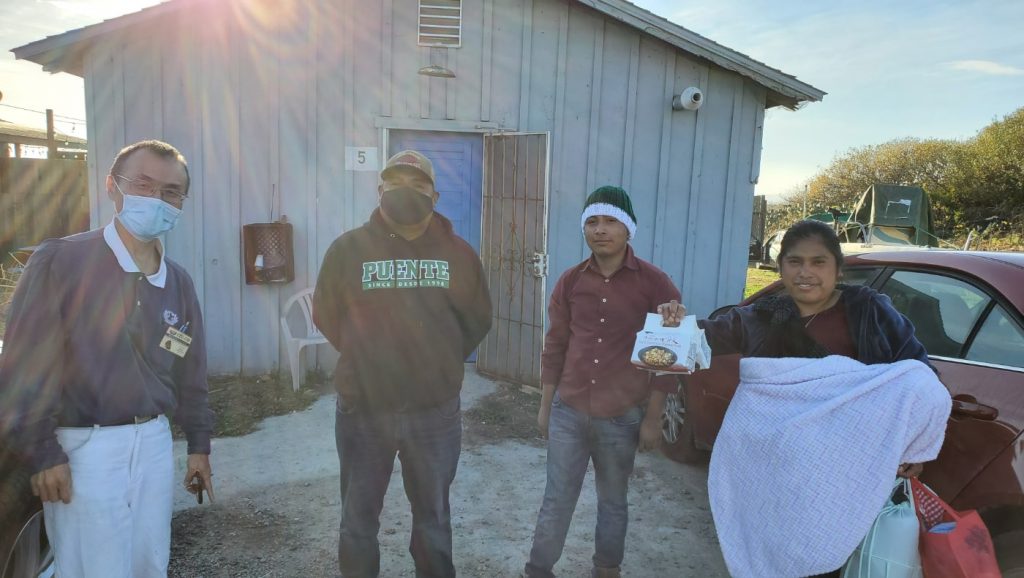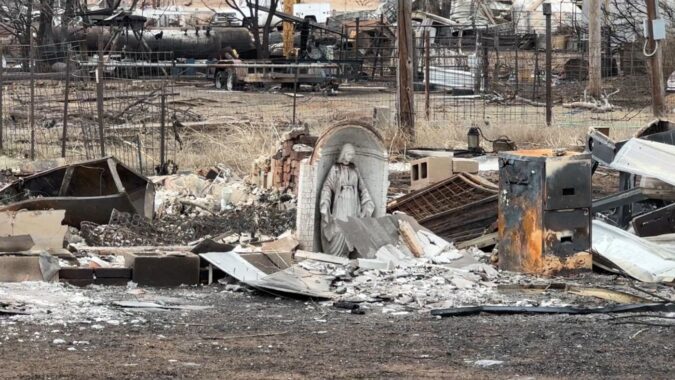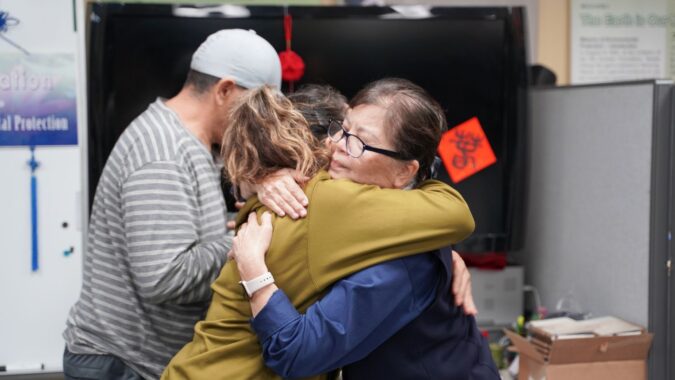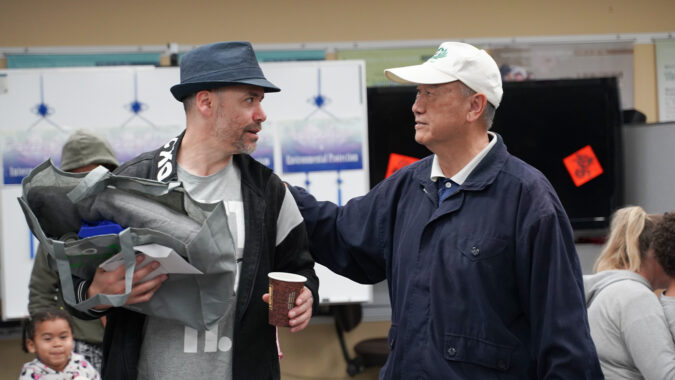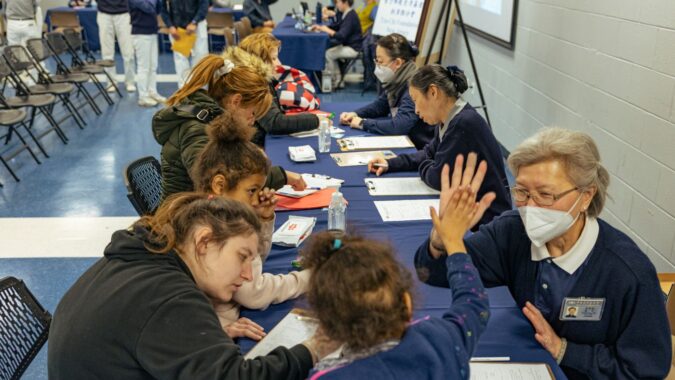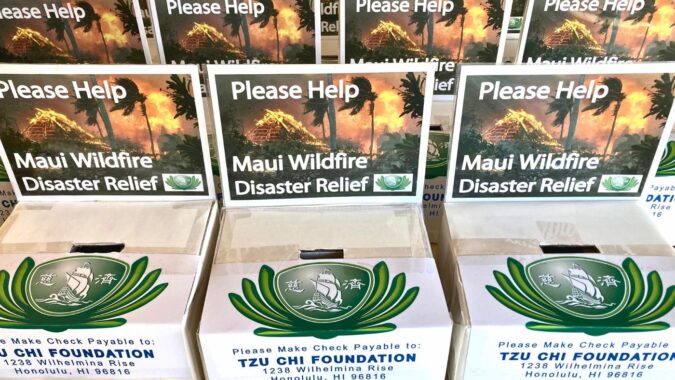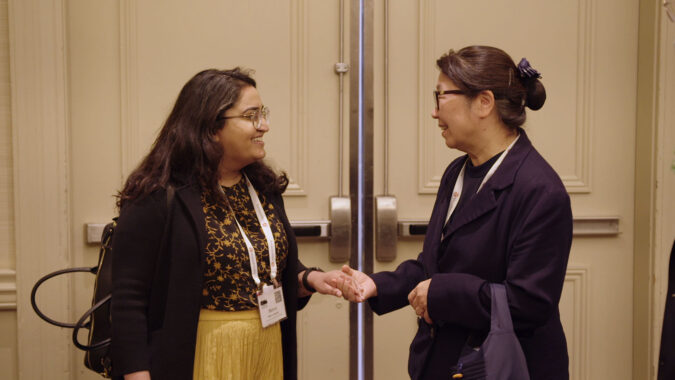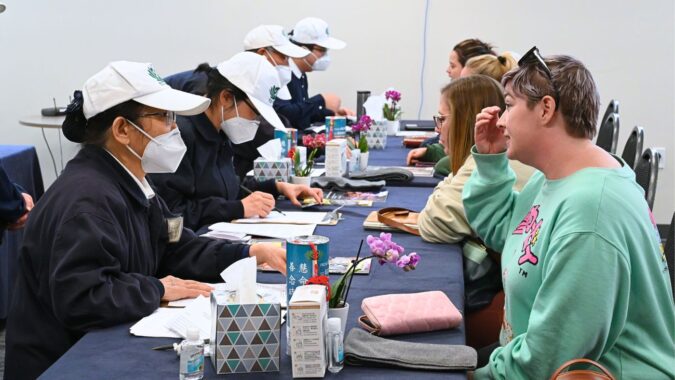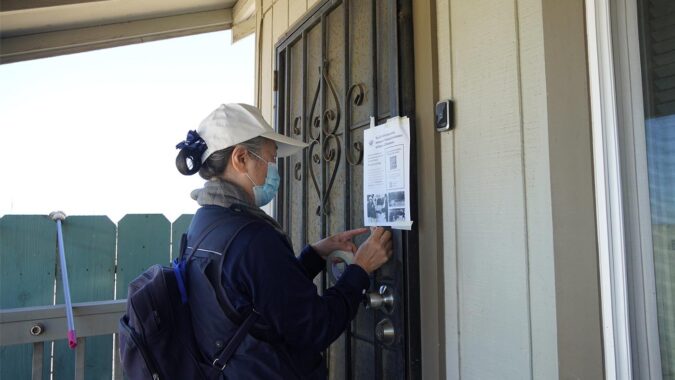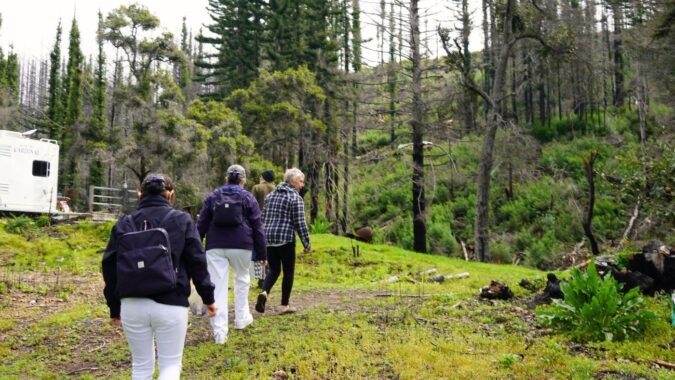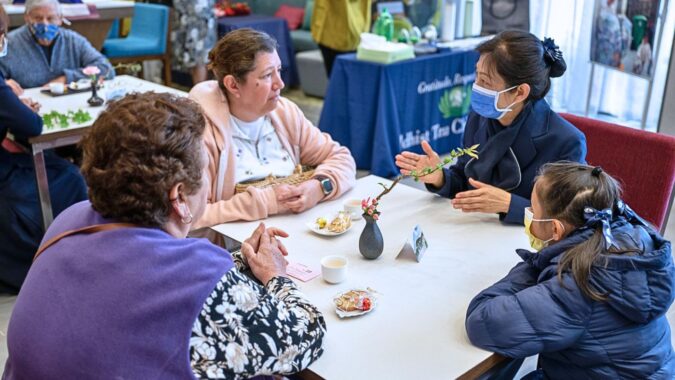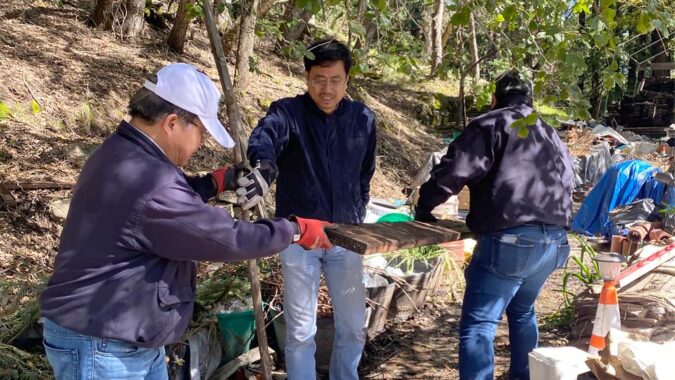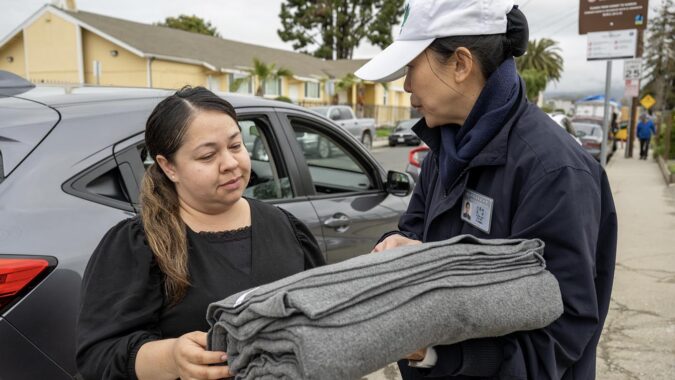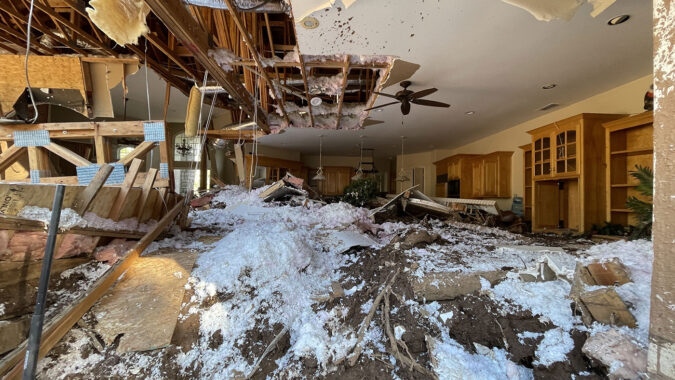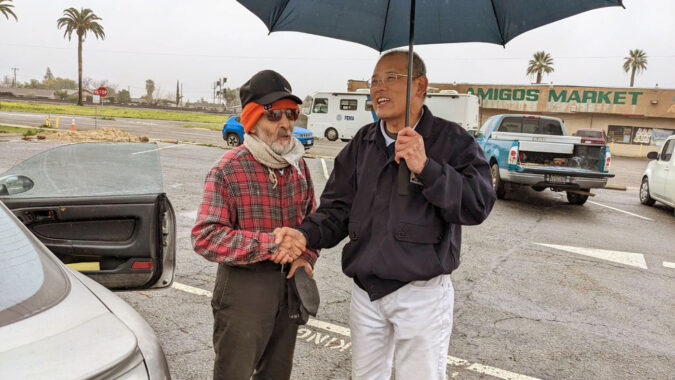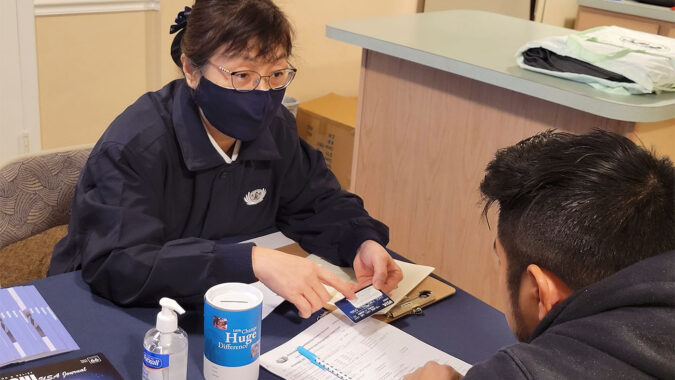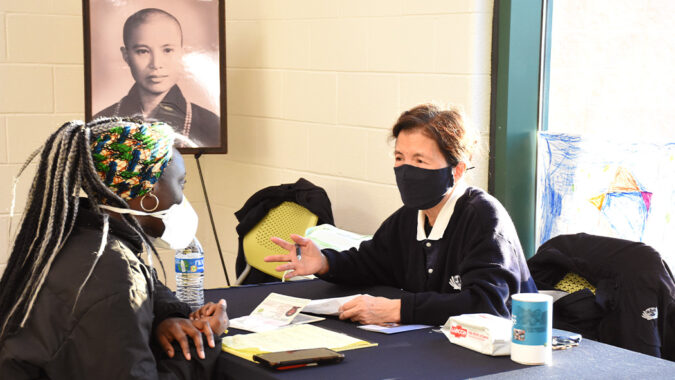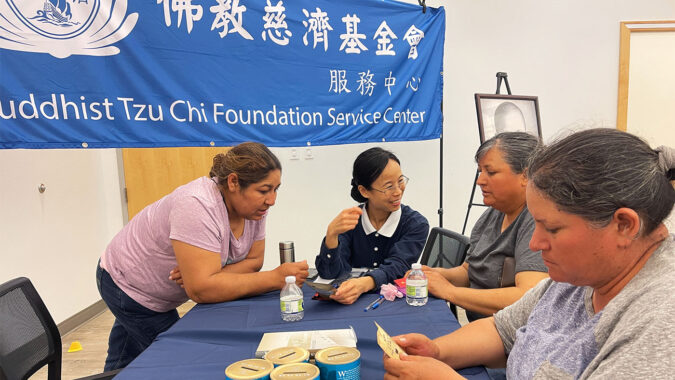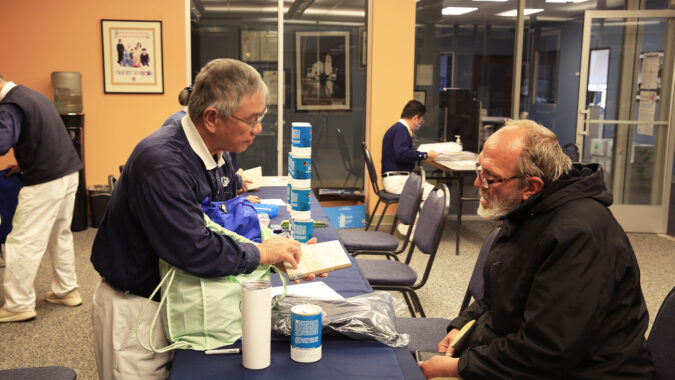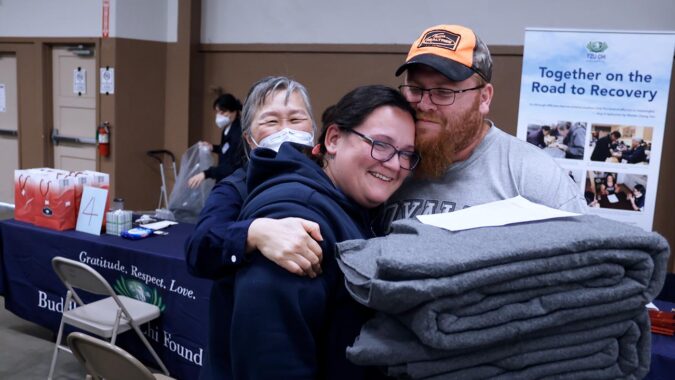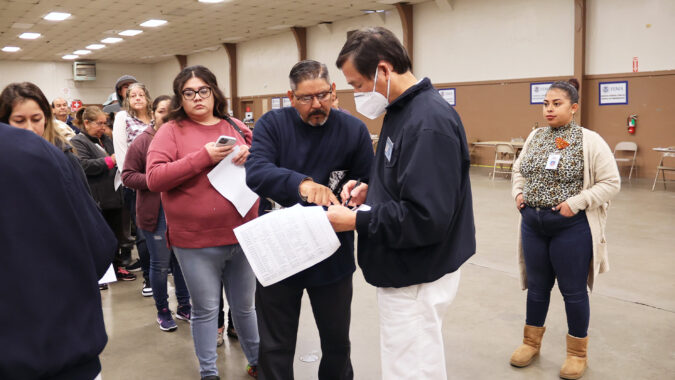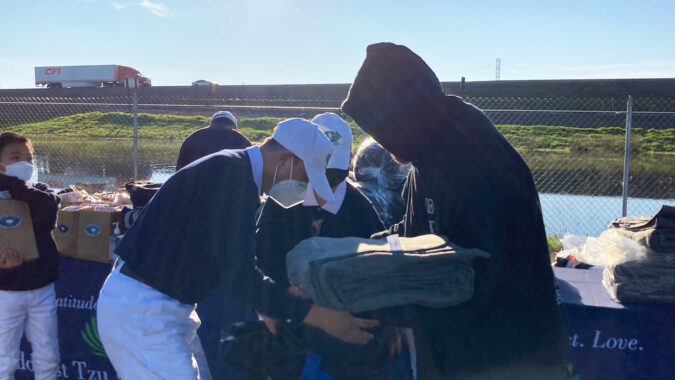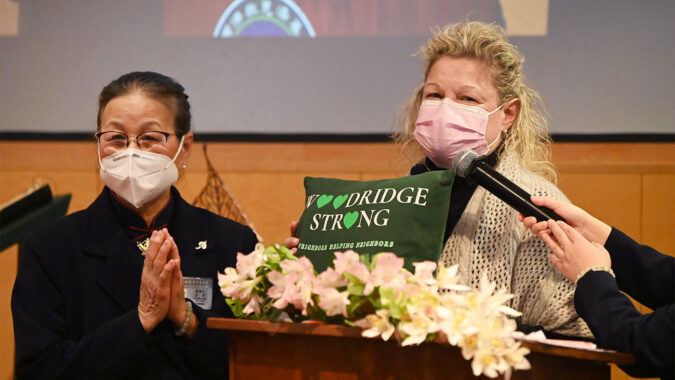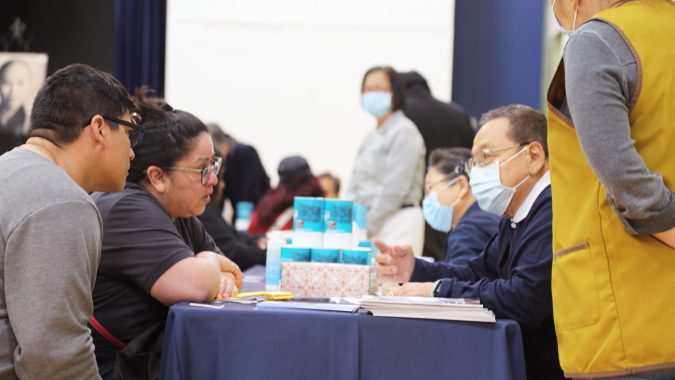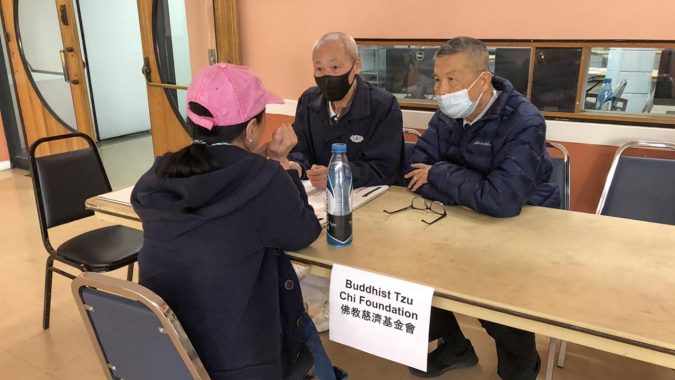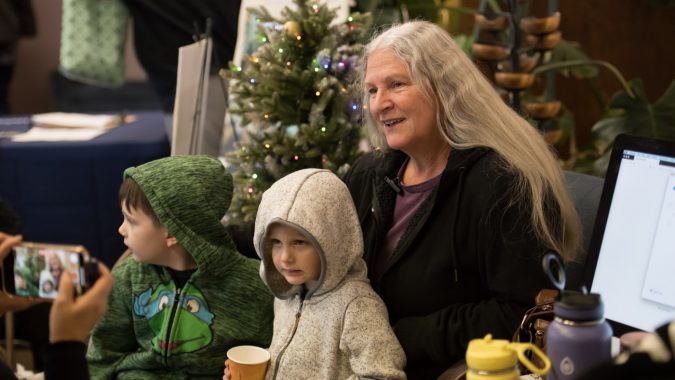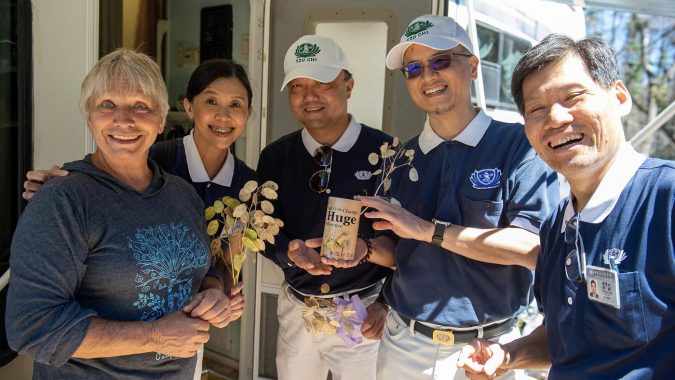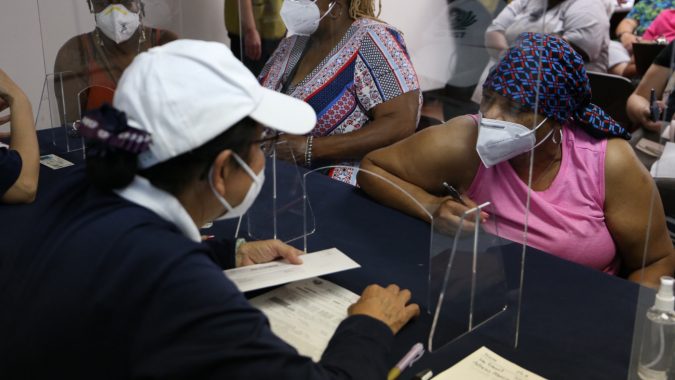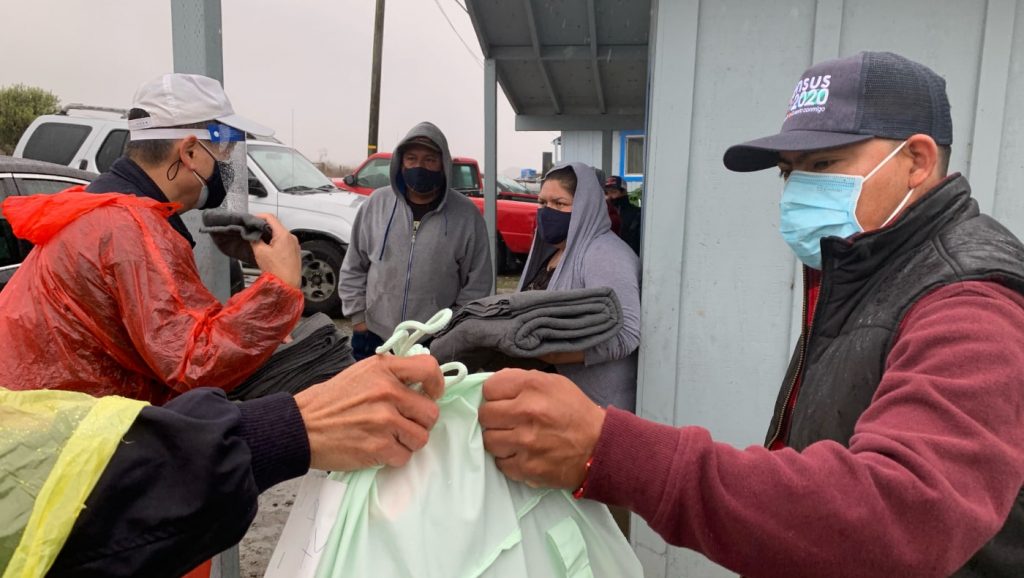
Written by Christina Chang
Translated by Mark Wan
Edited by Diana Chang and Maggie Morgan
Tzu Chi volunteers powered through a torrential storm, braving Northern California’s December winter rain. They drove the winding route around Swanton Road, through the mountainous region of Davenport; a few labor lodges were all that could be made out in between the windshield wipers as they vigorously swept away the downpour. Volunteers had reached their destination. Blankets, winter outfits, and daily hygiene packs were grabbed from the trunk before the team headed out to deliver a sense of warmth to those awaiting them inside.
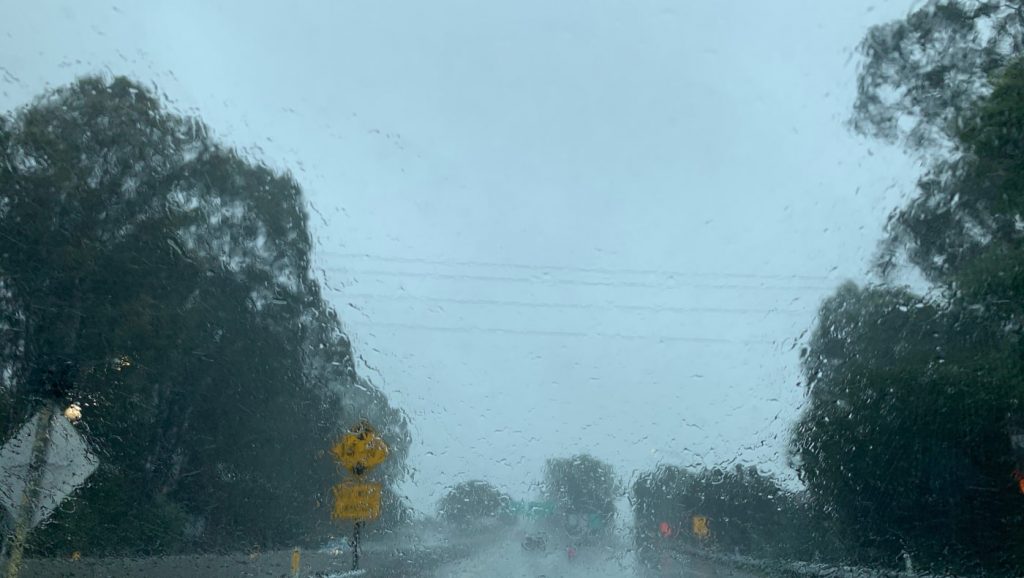
In 2020, Northern California was hit with wildfires amid a global pandemic. The combination of the flames and COVID-19 left already-vulnerable populations in a state of crisis. The summer and fall were times of solitude and survival, and Tzu Chi volunteers were particularly concerned about the well-being of farmworkers of Hispanic descent, students in need, and wildfire survivors, who lived scattered along that winding road in Santa Cruz County, sandwiched between the ocean and mountain forest.
On the frigid December distribution day, volunteers experienced the dire conditions many individuals were living in as they approached the freezing cold, sloshing wet area.
Tzu Chi volunteers visited two spots along Swanton Road; one a string of rundown stables that were refitted into labor lodges and another a natural living community. The labor lodges hold 12 single male units plus two Hispanic farming families while the majority of the 80 residential homes in the wooded living community were destroyed during Santa Cruz’s CZU Complex Fires. Tzu Chi volunteers brought enough winter supplies for residents of both dwellings, delivering blankets, scarves, socks, jackets, the instant Jingsi rice & noodles, and health packages consisting of medical face masks, cloth face masks, hand soap, shampoo, bars of soap, toothpaste and toothbrushes.
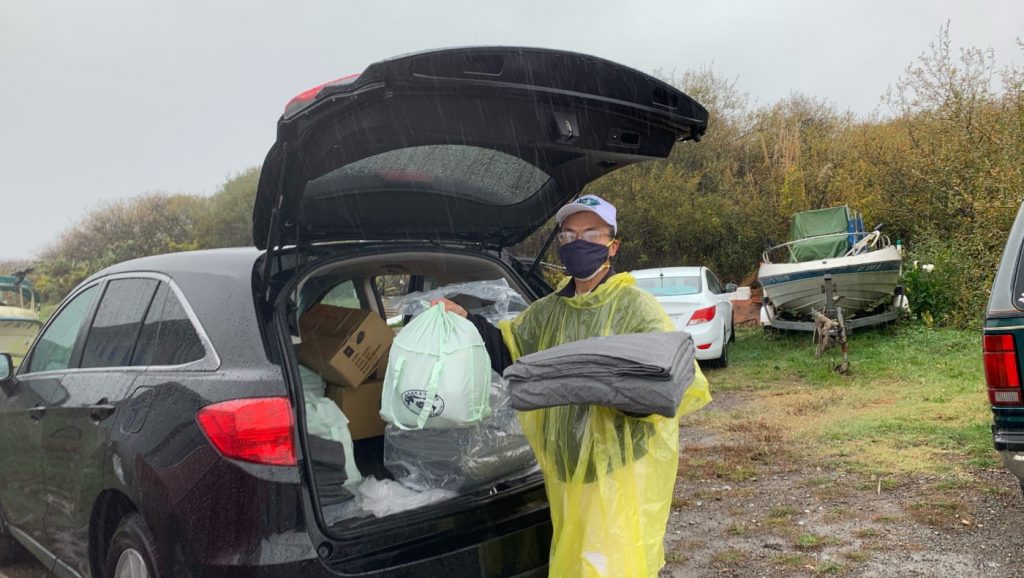
A Light Inside the Lodges
Earlier last fall, while donating computers to students from Hispanic farming families, Tzu Chi volunteers met a young man named Luis and his dad, Jorge; the two men were Guatemalan natives who the team found out worked as farmers nearby. The father and son said they slept in a single bed in a small room that had once been a horse barn, but had since been converted to living quarters for single, male immigrant workers. The men and the farmworkers they cohabitated with had provided for themselves by doing temporary jobs, but wildfires and COVID-19 were lethal for their living situation. Tzu Chi volunteers left the conversation compelled to do something. As winter was quickly approaching, it was a race against the clock to deliver warmth and comfort to these men who were so far from home.
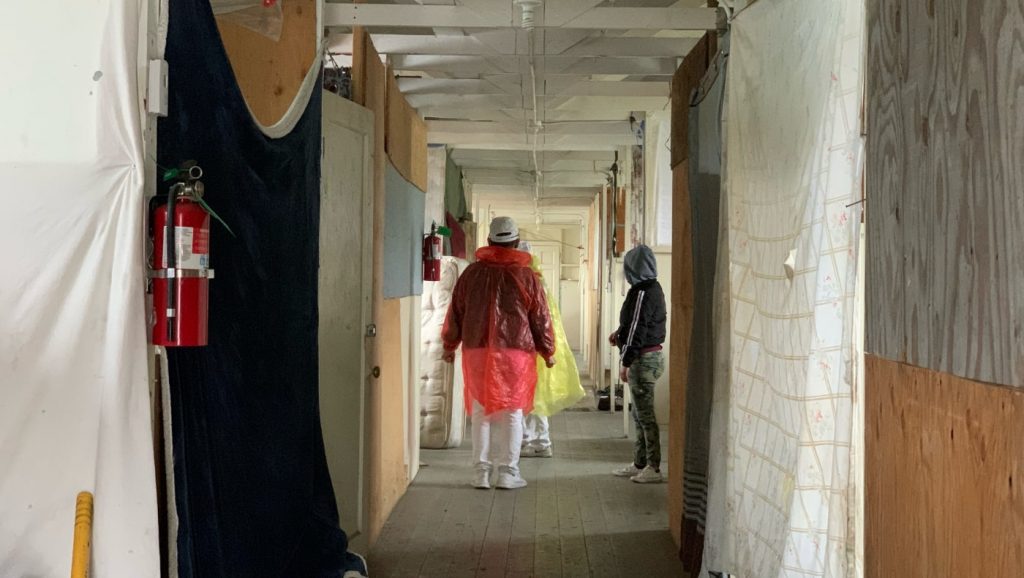
Chi-Jen Huang, Andy Chiang and Judy Liao, three members of Tzu Chi’s team, arrived at the barn in the heavy rain where Luis and Jorge happily welcomed them. The crew entered the lodges with supplies including coats, blankets, and hygiene bags to offer over ten farm workers who were huddled in the narrow spaces. As they sheltered themselves from the rain, the team saw these men had no heating devices, and were faced with living with the same frigid temperatures waiting outdoors. Everyone wrapped themselves in a blanket, and it was clear the warmth they felt was much more than physical. The men had been living in a helpless, lonely state which only compassion could melt away.
On top of the stressful circumstances that the wildfires and pandemic had created, the men were also facing the added obstacle of the agricultural off season. During the winter, farm workers typically go to restaurants for employment, but the pandemic had eliminated that option as Shelter in Place orders took charge. Rent was due, yet the men had no way to pay; it was the same dead end so many people were arriving at. When the Tzu Chi volunteers arrived offering a route towards relief, Jorge’s eyes noticeably flashed with joy.
Deeply moved by the Buddhist Tzu Chi Foundation’s aid, Esmeralda, a single farm worker who interpreted for the team, said:
You guys showed up on the dot, braving the heavy rain, gave us all we really needed: blankets, coats, and masks... Thank you all very much!
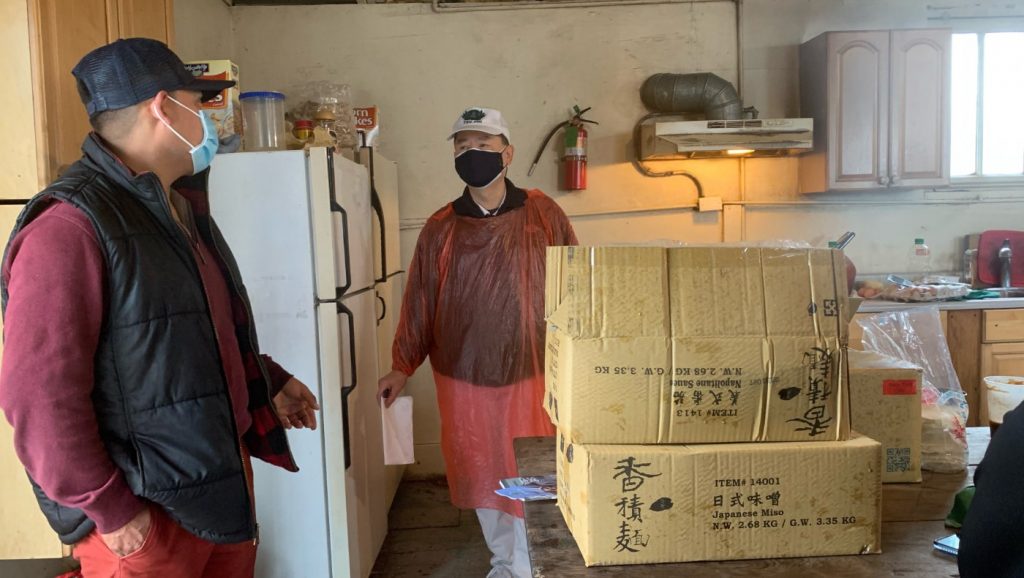
Another Shot for Last Chance
On the morning of December 6, Chi-Jen Huang, Robin Chang, and Jim Toelon of Tzu Chi USA traveled to their second stop on Swanton Road, one that twisted toward the forest and brought them to the intersection of Last Chance Road. The team waited for someone to bring them into the community, hidden on the mountain path. During an October distribution of cash cards for wildfire survivors, Jessica, a recipient, told Chi-Jen Huang that the remote mountain Community of Last Chance she lived in had been ravaged by the CZU Lightning Complex Fires. Self-reliant in maintaining its existence, the community encountered a self-imposed roadblock on its way to recovery. Tzu Chi’s team wanted to bring winter supplies on their visit, but they also set out to explore whether the team could assist in the community’s effort to rebuild.
Not long after the volunteers arrived at the site, a resident passed by on the way to a rebuilding meeting, and he led the team into the community. Last Chance Road, the only dirt road being privately maintained by community residents, is a bumpy one-lane trail, once dominated by mountain forests before the fires destroyed them. Steve, a road maintenance worker, described the scene right before the mountain wildfire. He said there had been a gust of wind that took down several trees. When the fires came, the whole community went up in flames, leaving none of the 80 homes on Last Chance Road unscathed. The mountain forest along the road also perished, and the once-mesmerizing scenery residents had grown accustomed to now only existed in their memories.
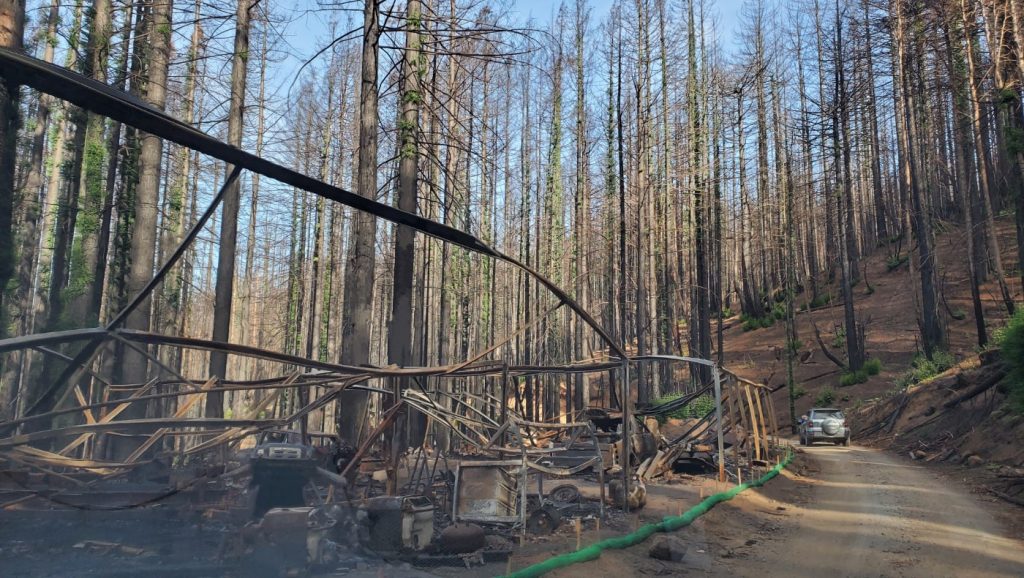
Volunteers arrived at the square of the community of Last Chance, where many residents were already waiting for the monthly meeting to commence. This was a community that prided itself on being autonomous in nature. The majority of their food was taken directly from the gardens that residents cultivated and harvested themselves. Power came out of the generators installed in every home. Water was drawn from the wells, creeks, or towers that collected rainwater. Almost everybody had a job, which he or she either performed within the community or outside near Santa Cruz.
In essence, all materials for daily needs were directly extracted from Mother Nature. Steve described the process saying, “We maintain a simple way of life through the exertion of intensive labor.” A lifestyle like that of Last Chance is extremely respectable, but as residents saw it was also dangerous as everything they depended upon was demolished overnight by the wildfires. In addition to their homes, residents lost a myriad of water reservoirs and vast expanses of land. Several months after the blaze, only some of the community’s residents moved back, and those that did were forced to perch on their trailers. The rest of the residents chose to stay at the foot of the mountain, only returning on the first Monday of each month for their rebuilding meeting.
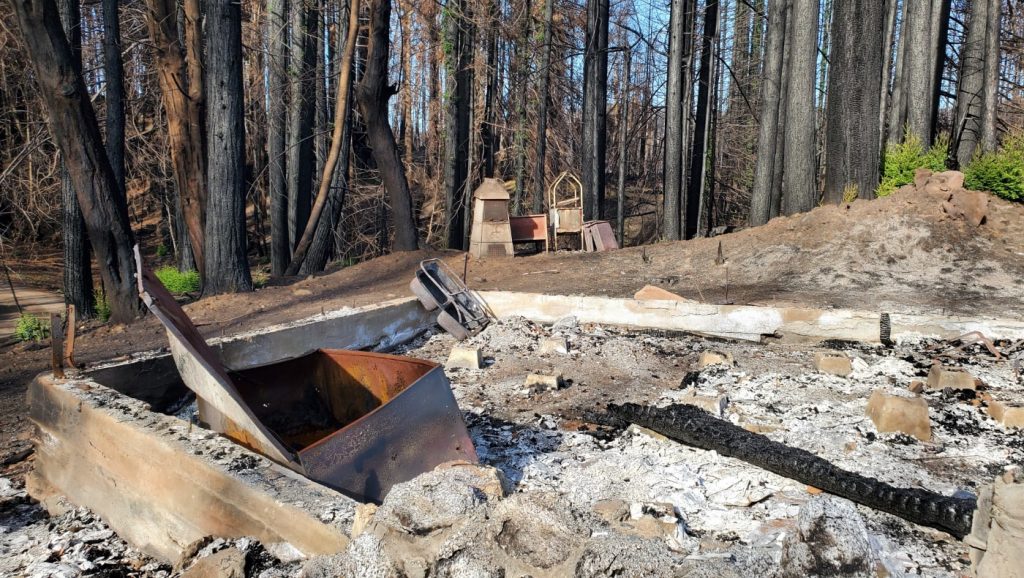
This Monday’s meeting was out of the ordinary and had a sense of hope that residents might have been returning for month after month: Tzu Chi volunteers explained that, in addition to the cash cards distributed right after the fire, they were here to deliver blankets, clothing, shoes and hygiene bags, and assess more ways to assist the community. All residents expressed their appreciation for the much-needed aid by a charity organization they had never heard of. But three survivors, who had received cash cards from the Buddhist Tzu Chi Foundation, approached volunteers after the meeting to personally thank them. Two residents told the team that they were participating in Tzu Chi’s Bamboo Bank Initiative and their banks were already half full; they were looking forward to the day they could return the favor that had once been paid to them.
The meeting was never short of love or or without hope, but there were moments where residents were overcome with sadness and expressed their shared helplessness in rebuilding the community. Jessica, the woman who had told Tzu Chi volunteers about Last Chance, was still emotionally distraught as her eyes filled with tears when talking about the future. Chi-Jen Huang felt the lingering sense of insecurity and hesitation in the air and thought of a kind of relief that had not yet been offered. The team member said, “Aside from participating in their monthly meetings, we also need to bring more books for residents to grapple with spiritual challenges of this kind.”
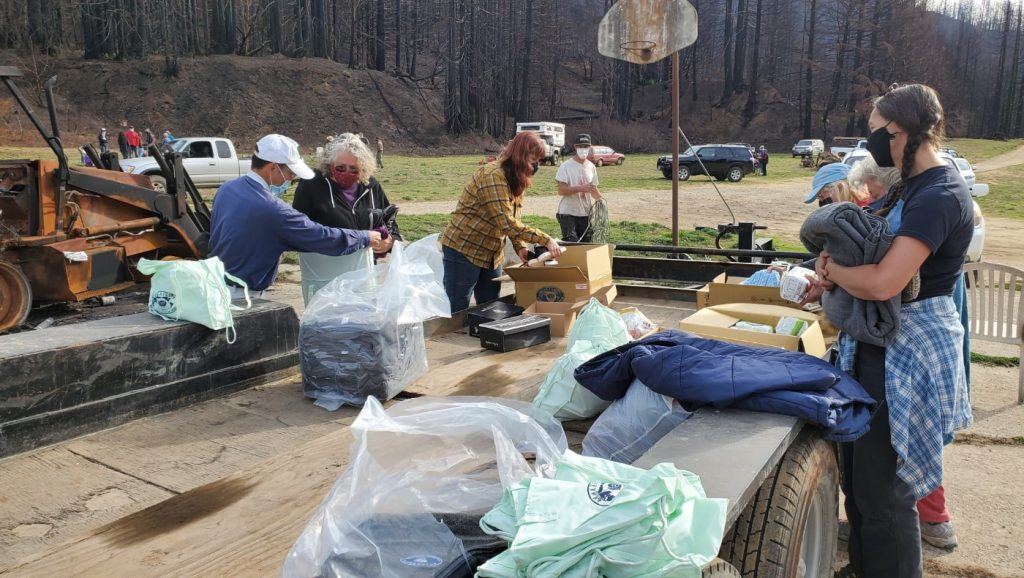
Surviving A Second Time
During the distribution of cash cards right after the wildfire, Tzu Chi volunteers got wind of Toni’s story, yet another tale of resilience that the team was moved to have come across. The woman said she had just recently secured temporary housing where she shared a small room with a friend, finally able to have a roof over her head, but it wouldn’t be for long. Out of nowhere, Toni’s home succumbed to a house fire that was triggered by an electrical short-circuit. Unhoused once again, Toni had no choice but to curl up in her small vehicle, parking wherever was allowed, where she would endure many freezing winter nights.
After the second fire, volunteers caught up with Toni and learned of her immediate circumstance. They immediately prepared an urgent cash card, daily essential bag, blanket and coat, and hurried to meet her. Toni, with a new coat on her back, relayed her gratitude to volunteers:
Thank you for bringing love and hope. I used to think that nobody cared about me, but you proved me wrong with all these supplies. I am really appreciative of you all." With a Tzu Chi bamboo bank in her hand, she continued, "I am going to introduce Tzu Chi to all my friends, and ask them to support you as well. And when the bamboo bank is filled up, I will surely come back to you.
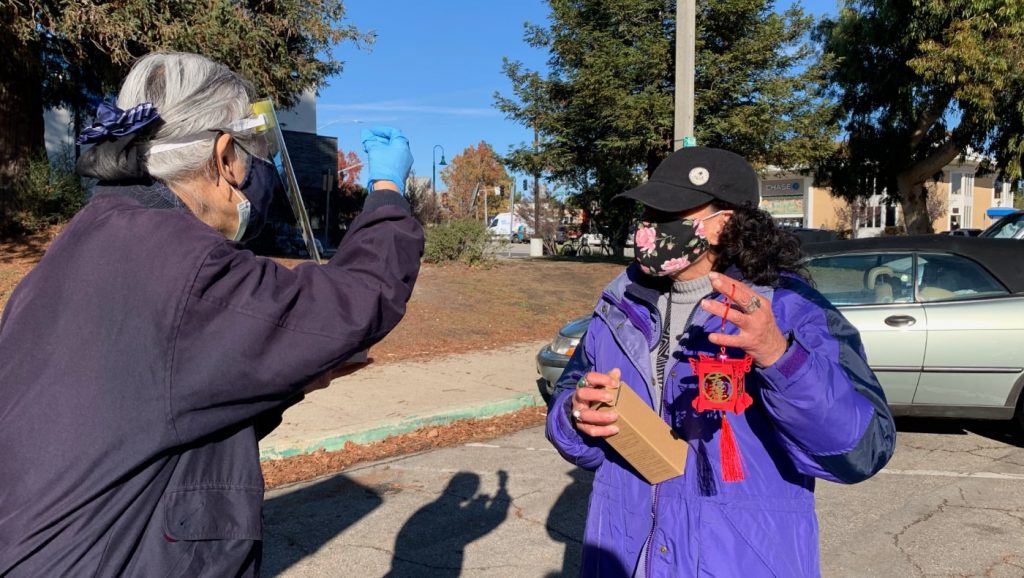
As the seasons changed, the pandemic only persisted and intensified, and fear lingered long after the flames of the wildfire had been extinguished. Tzu Chi volunteers knew that the suffering was far from over, and several people still needed relief from the combination of current events. With Tzu Chi’s support, recipients would be able to see a glimpse of long-awaited light at the end of the tunnel, just in time for the New Year.
